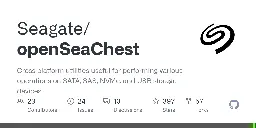
I did quite some research when I worked with the WD Red Plus drives and also tried the -S switch, without success.
In openSeaChest I just set the number of milliseconds for each power mode and it just works. I'm happy with that.
Simple and maintained:
Came here just to see if somebody already gave that answer. Thanks, bye 🫡
Yes, self-hosting my email server since 2 years without issues so far. I only send a handful of emails per month but haven't stumbled into any issues of being blocked by any big provider, even the ones that are known to block small email servers here in Germany. I enjoy the flexibility of as many aliases and distribution groups as I want for the family and being able to configure the anti-spam-component the way it works best for us.
I run everything on a small VPS at a known provider and checked the IP against block lists. It was indeed listed on one but I never had issues and when checking again a few days ago it wasn't listed on any list anymore.
First I tried the available all-in-one solutions but troubleshooting is hard if you don't know each component.
So, I followed this guide but moved all components in their own docker containers instead of installing natively to be more failsafe regarding system upgrades:
https://workaround.org/ispmail-bullseye/
Everything is running fine and in case of issues I know exactly how each component is set up and can troubleshoot quickly.
This.
Having a subscription doesn't mean you have the right to pirate when the service goes down. You only own what you buy.
Add --no-remote to start different profiles simultaneously.
Example:
firefox -P 'Joel User' --no-remote
I'm a long-term Linux user living mostly on the terminal, knowing quite a lot about the operating system. And sometimes I enjoy tinkering to get a game running even more than playing it. But in the end for some games it just doesn't work. Of course it depends on the game and hardware and what not, but in the end if I can't play all my games on Linux I have to bite the bullet and check for alternatives. And for me this statement is hard as hell.
I've seen this exact situation so many times.
- Ask the community about gaming on Linux
- Get the response that it works (install Steam and play)
- Install Steam
- Game doesn't work
- Invest hours in troubleshooting
- Have the community explain why it doesn't work in your particular case
- After hours of fiddling get it working
I've been in this situation myself so many times. I like fiddling with my system but even I ended up dual-booting Windows just for gaming.
Cross platform utilities useful for performing various operations on SATA, SAS, NVMe, and USB storage devices. - Seagate/openSeaChest

Just want to share some love about Seagate.
My new DIY NAS is idle most of the time so I want to configure it to be as power efficient as possible.
I spent a couple of evenings trying to make my new WD Red Plus drives go to standby (spindown) after 30 minutes of inactivity, without success. I read about WD not respecting hdparm commands, interpreting them differently and tried all suggestions, again without success. I even read about WD support saying they don't support Linux. Strange as most of the available consumer NAS systems are based on Linux.
I then decided to try my 2nd choice drives: Seagate Ironwolf. On the first attempt they also didn't go to standby after configuring with hdparm. Then I found this: Seagate offers an open-source suite of tools named openSeaChest, which lets you configure and test your drives in any possible way including firmware updates and ... tada, power settings. After enabling idle_c and standby_z and configuring the timers the drives now do how I configured.
I returned the WD drives. Now Seagate is my top choice for future drive purchases 🧡
Wow, very detailed list. I will surely find some apps to add to my mostly open-source setup.
Thanks for sharing.
 slaecker @lemmy.world
slaecker @lemmy.world father, geek, self-hoster, privacy-advocate, musician, song-writer